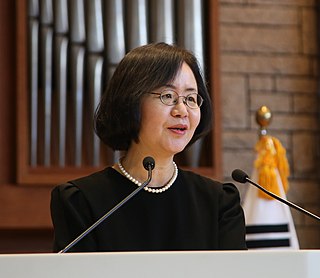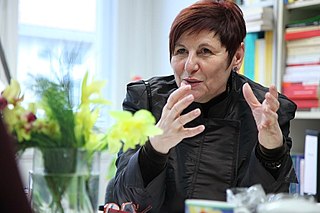Related Research Articles
Gisela Bock is a German historian. She studied in Freiburg, Berlin, Paris and Rome. She took her doctorate at the Free University Berlin in 1971 and her Habilitation at Technische Universität Berlin in 1984. She has taught at the Free University Berlin (1971–1983) and was professor at the European University Institute (1985–1989) in Florence, Italy, at the University of Bielefeld (1989–1997) and then at the Free University Berlin. She retired in 2007.

Marie Calm was a German author, feminist and advocate of women's suffrage.

Cäcilia (Cillie) Rentmeister is a German art historian, culture scientist and researcher of cultural conditions of women and of gender. In addition to studying the different realities in which men and women are living, she has concerned herself with the matriarchy.

Ruth Hagengruber is a German philosopher, currently professor and head of philosophy at the University of Paderborn. She specialises in the history of women philosophers as well as philosophy of economics and computer science and is a specialist on Émilie Du Châtelet. Hagengruber is the director of the Center for the History of Women Philosophers and Scientists and founder of the research area EcoTechGender. She invented the Libori Summer School and is the creator of the Encyclopedia of Concise Concepts by Women Philosophers, for which she holds the position of editor in chief together with Mary Ellen Waithe.

A technology museum is a museum devoted to applied science and technological developments. Many museums are both a science museum and a technology museum.

Katharina Oguntoye is an Afro-German writer, historian, activist, and poet. She founded the nonprofit intercultural association Joliba in Germany and is perhaps best known for co-editing the book Farbe bekennen with May Ayim and Dagmar Schultz. The English translation of this book was entitled Showing Our Colors: Afro-German Women Speak Out. Oguntoye has played an important role in the Afro-German Movement.
Karola Bloch was a Polish-German architect, socialist, and feminist. She was the third wife of the German philosopher Ernst Bloch.
Feministische Organisation von Planerinnen und Architektinnen is an organisation working to address gender issues in the built environment generally and among professionals active in this field.

Paul Diepgen was a German gynecologist and historian of medicine. He was born in Aachen.

Helga Hörz is a German Marxist philosopher and women's rights activist. Before 1990 she was a university teacher of Ethics in the Philosophy Department at the Humboldt University in (East) Berlin. She was persuaded to retire on health grounds in October 1990, but in the words of one headline writer slightly less than twenty years later, this has left her "winding down, but not muzzled".
Karin Flaake is a German sociologist and professor (retired) at the Carl von Ossietzky University Oldenburg. Her publications on the adolescence of young women and men are part of the literature of socio-psychologically oriented gender research. Another focus of her work is on the chances of changing gender relations in families.
Julius Magg was an Austrian engineer and university professor. In the early 20th century, he contributed significantly to the further development of the Diesel engine. Later, he was known as the founder of the Graz method of engine design.

Meehyun Chung is a professor of the United Graduate School of Theology in Yonsei University and serving as the first female chaplain of Yonsei University. She was the editor of Korean Journal of Systematic Theology.

Anne Klein was a German lawyer and, at the time of German reunification, a Berlin Senator. Her politics were green. Her focus as a senator was on women's rights. She was also the first Berlin senator to "go public" about being a lesbian.

Renate A. Tobies is a German mathematician and historian of mathematics known for her biographies of Felix Klein and Iris Runge.

Barbara Kluntz was a German composer and music teacher. On all of her book titles, she calls herself "Barbara Kluntz the Noble Music Art Lover", in order to explicitly emphasize her position: She did not consider herself a professional musician.

Sigrid Metz-Göckel is a German sociologist, political scientist and social psychologist who specializes in women's and gender studies as well as in educational research and didactics. She is a professor emerita at the Technical University of Dortmund. In the late 1970s, Metz-Göckel pioneered women's studies in Germany which became an established university course in Dortmund in 1971.

Hildegard Maria Nickel is a German sociologist and feminist who has specialized in the sociology of work and gender studies. From 1977, she was attached to the East-German Academy of Pedagogical Sciences becoming a full professor at the Institute for Social Sciences at Humboldt University, Berlin, from 1992 until her retirement in 2014. In 1994, she received the Helge Pross Prize from the University of Siegen for her contributions to family and gender studies. From 2002 to 2008, Nickel was State Secretary for Economy, Labour and Women at the Senate of Berlin.
Bettina "Tine" Plesch was a German music journalist and feminist author.
Rita Casale is an Italian-German educationalist, philosopher and university lecturer at the Bergische Universität Wuppertal. Her research and publications focus on philosophy of education as well as feminist theory and history.
References
- ↑ 10 Jahre Naturwissenschaftlerinnen- und Technikerinnenbewegung: Wie fing damals alles an? Was ist aus uns geworden? In: Martina Rački (Hrsg.): Frauen(t)raum im Männerraum. Selbstverwaltung aus Frauensicht. Frankfurt am Main 1988, S. 299f. nach Helene Götschel: Die Geschichte des Kongresses von Frauen in Naturwissenschaft und Technik 1977 bis 1989. Schriftenreihe / NUT – Frauen in Naturwissenschaft und Technik e.V., Band 8. Talheimer, Mössingen-Talheim 2002, ISBN 3-89376-095-4, S. 41–42.
- ↑ in: Protokolle – Informationsdienst für Frauen 2 (1977), Nr. 18, S. 14f. nach Helene Götschel: Die Geschichte des Kongresses von Frauen in Naturwissenschaft und Technik 1977 bis 1989. Schriftenreihe / NUT – Frauen in Naturwissenschaft und Technik e.V., Band 8. Talheimer, Mössingen-Talheim 2002, ISBN 3-89376-095-4, S. 42–43.
- ↑ Kira Stein: "Ohne Frauen fehlt der Technik was!" Die Geschichte der Frauen–Technik–Netzwerke und ihre Bedeutung für Mädchen–Berufsorientierungsprojekte. In: Wenka Wentzel, Sabine Mellies, Barbara Schwarze (Hrsg.): Generation Girls' Day. Budrich UniPress, Opladen / Berlin / Farmington Hills, Michigan 2011, ISBN 978-3-940755-83-4, S. 84.
- ↑ Christiane Erlemann: Räumliche Aspekte von Frauenunterdrückung. Studienarbeit an der RWTH, Aachen 1978.
- ↑ Christiane Erlemann: Frauen-Baustelle „Alibi-Klo". 30. Mai, Samstag Mittag, wurde der Raschplatz in Hannover zur Frauenbaustelle. In: ARCH+ 60 Kein Ort, nirgends – Auf der Suche nach Frauenräumen (December 1981), S. 10 (archplus.net, retrieved 6 February 2022).
- ↑ Fachkonferenz "Frauenstudiengänge in Ingenieurwissenschaften und Informatik", idw – Informationsdienst Wissenschaft (idw-online.de, 9 December 1999, retrieved 6 February 2022).
- ↑ Neu: Erste Gender/Innovationsprofessur, idw – Informationsdienst Wissenschaft (idw-online.de, 5 December 2001, retrieved 6 February 2022).
- ↑ Projekte der Bundesinitiative „Gleichstellen – Frauen in der Wirtschaft", ESF-Förderperiode 2007 bis 2013 (esf.de, retrieved 6 February 2022).
- ↑ Stiftung Deutsches Technikmuseum Berlin, Sammlung online (technikmuseum.findbuch.net, retrieved 3 February 2022).